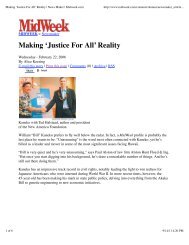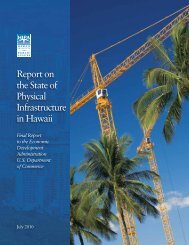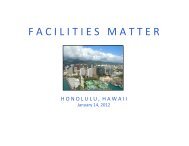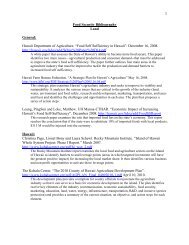Hawai'i Fisheries Initiative - The Hawaii Institute for Public Affairs
Hawai'i Fisheries Initiative - The Hawaii Institute for Public Affairs
Hawai'i Fisheries Initiative - The Hawaii Institute for Public Affairs
You also want an ePaper? Increase the reach of your titles
YUMPU automatically turns print PDFs into web optimized ePapers that Google loves.
u Marine Debris Research, Prevention,<br />
and Reduction Act – Signed into law<br />
in 2006, the act establishes programs<br />
to identify, assess, reduce, and prevent<br />
marine debris and its effects on the marine<br />
environment and navigation safety. <strong>The</strong> act,<br />
which was introduced by Hawai‘i Senator<br />
Daniel Inouye, is implemented via NOAA’s<br />
Marine Debris Prevention and Removal<br />
Program, with coordination between the<br />
EPA and the U.S. Coast Guard. <strong>The</strong> act<br />
specifically targets fishing gear as a threat<br />
to the marine environment and navigation<br />
safety, and authorizes and funds research<br />
and development of alternative types of<br />
fishing gear to enhance the tracking and<br />
recovery of discarded gear. 419<br />
u Coastal Zone Management Act 420 – Act was<br />
enacted in 1972 to encourage coastal states<br />
to develop comprehensive programs to<br />
manage and balance competing uses of and<br />
impacts to coastal resources. Section 307 of<br />
the CZMA, called the federal consistency<br />
provision, is a major incentive <strong>for</strong> states<br />
to join the national coastal management<br />
program, and is a powerful tool that<br />
states use to manage coastal uses and<br />
resources and to facilitate cooperation and<br />
coordination with federal agencies. Under<br />
authority of the CZMA, NOAA’s Office of<br />
Ocean and Coastal Resource Management<br />
works with state coastal resource managers<br />
to develop marine protected areas 421 (MPAs)<br />
and restore coral reef ecosystems.<br />
u Coral Reef Conservation Act of 2000 422 –<br />
Act was enacted to preserve, sustain,<br />
and restore coral reef ecosystems and<br />
to promote their wise management and<br />
sustainable use. <strong>The</strong> act funds conservation<br />
programs, including projects that involve<br />
local communities and non-governmental<br />
organizations. <strong>The</strong> implementation plan<br />
calls <strong>for</strong> focus on mapping and in<strong>for</strong>mation<br />
management; research, monitoring, and<br />
assessment; international issues; education;<br />
and local strategies developed by the states<br />
or regional fisheries councils.<br />
Federal Agencies Overseeing<br />
<strong>Fisheries</strong> Management<br />
Department of Commerce/NOAA’s<br />
National Marine <strong>Fisheries</strong> Service –<br />
NMFS is the lead agency in managing and<br />
conserving living marine resources within<br />
the U.S. EEZ. NMFS provides scientific<br />
and policy leadership in the international<br />
arena, and plays a key role in the<br />
management of living marine resources<br />
in coastal areas under state jurisdiction.<br />
NMFS implements science-based conservation<br />
and management measures and<br />
actions aimed at sustaining long-term use<br />
and promoting the health of coastal and<br />
marine ecosystems. 423 NMFS publishes the<br />
annual Status of U.S. <strong>Fisheries</strong> Report to<br />
Congress. 424<br />
NMFS Pacific Islands Regional Office –<br />
PIRO manages programs that support<br />
both domestic and international conservation<br />
and management of living marine<br />
resources. Bounded by the <strong>Hawaii</strong>an<br />
Archipelago in the north, American Samoa<br />
and U.S. Pacific remote island areas in<br />
the south, and the Mariana’s Archipelago,<br />
including Guam, in the west, the Pacific<br />
Islands Region encompasses the largest<br />
86







